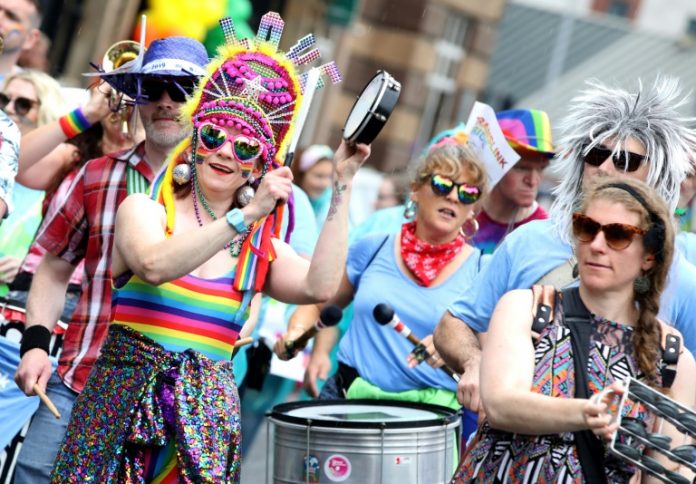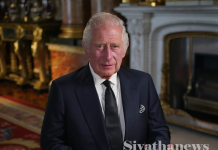Thousands of supporters of Northern Ireland’s LGBT community took to the streets of Belfast on Saturday in Pride celebrations buoyed by the promise that same-sex marriage could soon be legal.
An armoured police vehicle was decked out in rainbow colours and rainbow flags peppered the crowd, while a sound system blared out hit anthem “It’s Raining Men” in defiance of the summer showers.
Leo Varadkar, prime minister of the Republic of Ireland to the south, joined the parade, which was filled with fancy-dress and families, chants of “trans rights are human rights” and “up the queers”.
The rainbow flag was raised over Belfast city hall for the first time in its history to hail the start of celebrations, a move described as “hugely significant” by mayor John Finucane.

The event comes just weeks after the British parliament voted to extend same-sex marriage and abortion rights to Northern Ireland, which lags behind the rest of the country on equality issues.
The law would be changed unless the devolved government in Belfast, which has been suspended since January 2017, is reinstated by October 21.
“Everybody’s entitled to the same rights, so here’s hoping, yes, that it goes through,” said Mary Francis White, a 53-year-old social care worker whose son is an openly gay Belfast councillor.
“And if it does go through, 100 percent absolutely there’ll be a big, huge party.”
Supporters of the global rights group Amnesty held up banners saying “Love is a human right”, while members of the clergy were also present.
One offered the eucharist to Pride participants on the steps of St. Anne’s Cathedral under a sign reading “The church supports marriage equality” whilst another marched with a placard saying “We are sorry for how the church has treated LGBTQI+ people.”

Opinion polls show both abortion and same-sex marriage enjoy popular support in Northern Ireland.
But one of its main political parties, the Democratic Unionists (DUP), is strongly opposed and argues such issues should be decided in Belfast.
“We’re still fighting for rights here,” said John Eltham, a 46-year-old geographic consultant with a beard dyed in rainbow colours.

“It has been incredibly frustrating. Some of our politicians here really don’t represent the majority view in Northern Ireland and there has been a desire for equal marriage here.”
Lawmakers in London chose to act after a cascade of headline-hitting developments across the island.
In May 2018, the Republic of Ireland held a referendum to repeal their ban on abortion, voting with a landslide 66 percent in favour.
The case of a mother facing prosecution for allegedly buying abortion pills on the internet for her 15-year-old daughter has gained prominent media attention in Northern Ireland.
The fatal shooting of gay journalist Lyra McKee by dissident republicans in the Northern Irish city of Londonderry in April added to pressure for change.

Even though her death does not appear to have been linked to her sexuality, McKee has become an icon for the marriage equality movement.
Her partner Sara Canning had called on London to act, and also met with Varadkar in Belfast Saturday.
But while many will be celebrating the imminent breakthrough, campaigners remain on an active footing.
“There’s still a long way to go. The trans healthcare system in Northern Ireland is in a crisis state,” said Alexa Moore, the 19-year-old director of Transgender NI.
If the legislation comes into effect in October, the first same-sex marriages are slated to take place in January 2020.












